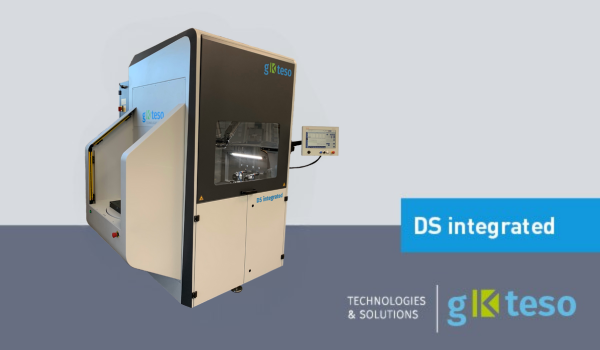Deburr small parts for burr-free series production
Burrs on small parts disrupt fits, increase scrap, and slow down material flow. At gKteso, we deburr your small parts automatically directly in the line, resulting in burr-free outcomes without rework, allowing the parts to proceed to the next process step assembly-ready.

Why is deburring small parts important?
Small parts are often produced in high quantities with intricate contours. Even small burrs are enough to disrupt assembly or make entire batches unusable.
-
Assembly problems: Fits are not exact, parts jam, and processes are delayed.
-
Increased handling risk: Sharp edges on small parts lead to cuts and additional protective efforts.
-
Tool wear: Burrs damage clamping tools and cutting inserts in subsequent processes.
-
Unclean appearance: Burrs reduce surface quality and the visual appeal of the parts.
- High rejection rate: Faulty sealing surfaces and damaged small parts end up as scrap, increasing costs.
A defined process for deburring small parts ensures stable quality and smooth operations.
What methods are there for deburring small parts?
Small parts can be deburred in various ways. The appropriate method depends on geometry, material, and desired outcome. In practice, these methods are primarily used:
Brushing
Rotating brushes remove small burrs on surfaces and edges. They easily round off and are suitable for small parts with medium surface requirements.
Grinding
Grinding wheels or belts remove heavier burrs. This method creates smooth surfaces and is suitable for larger areas.
Milling
Milling cutters remove burrs on complex geometries. Even hard-to-reach areas or deep holes can be safely processed.
Countersinking
A deburring countersink removes burrs on holes and creates clean edges, improving fit accuracy and sealing.
Thermal deburring (TEM)
A controlled gas explosion removes burrs simultaneously on all edges and internal surfaces. The method is particularly suitable for complex small parts with many interior areas.
Electrochemical deburring (ECM)
An electrochemical process dissolves burrs without mechanically altering the base material. Ideal for delicate small parts with tight tolerances.
Mass finishing (Trowalizing)
In the rotating container, abrasive bodies move together with the small parts. This creates uniform edge profiles and improved surfaces.
Blasting
With glass beads, sand, or corundum, burrs can be widely removed. Additionally, a homogeneous surface appearance is created.
Each method has advantages and limits. Crucial is how you use the small parts in the subsequent process. Automated solutions combine several methods in one line.
Automated deburring of small parts with gKteso
Our systems deburr small parts inline and deliver reproducible results in series. Sensors capture each part, determine machining paths, and control the tools precisely. This results in burr-free small parts that continue assembly-ready without manual rework.
Technical features of our systems
- High repeatability: Five-axis machining allows deburring with tolerances up to 0.05 millimeters.
- Processing complex geometries: Contours, holes, and internal areas run in one process.
- Inline quality assurance: Scanners and touch probes check each part and store the data automatically.
- Low maintenance structure: Operators can perform many maintenance tasks themselves, without external service technicians.
Our systems process steel, stainless steel, aluminum, and other non-ferrous metals.
What advantages does machine deburring offer?
Assembly-ready small parts
The parts leave the system with burr-free edges and a uniform finish. This eliminates time-consuming rework, and the components go directly to the next production step.
Process-secure quality
Each part goes through the same process with integrated measurement. The system immediately detects deviations and facilitates release for series production.
Stable production flow
Loading, deburring, and unloading run in parallel, significantly reducing downtimes. This way, the output per shift increases, and planning reliability improves.
Lower piece costs
Longer tool life and less scrap noticeably reduce ongoing costs. Additionally, the effort for manual rework decreases, making the entire process more economical.
Overview of our deburring machines
We develop a customized concept with you and tailor the system precisely to your parts and processes. Based on drawings, photos, or sample parts, we create specific solution proposals.

DS Base
The DS Base is suitable for small to medium series of small parts. It combines deburring, brushing, rounding, threading, and fit surface treatment in one process. Thanks to its compact design, it can be easily integrated into existing lines. Up to 16 stations and a work area of 500 x 500 x 300 millimeters allow the processing of various geometries. The five-axis control ensures consistent quality and short changeover times.

DS Integrated
The DS Integrated is designed for high quantities and changing geometries. It combines deburring, brushing, measuring, marking, and back surface machining in a continuous process. A rotary table or change table minimizes idle times and increases the cycle rate. With up to 16 stations and a work area of 500 x 500 x 300 millimeters, the system also processes complex small parts. Optional wet or dry processing is available, complemented by automatic feeders for direct integration into existing lines.
This is how small parts deburring works
In the first step, the feeding system positions the small parts in the work area. Sensors capture the geometry and calculate the appropriate strategy. Subsequently, brushes, grinding discs, or milling cutters remove burrs on edges and internal areas.
This is followed by fine processing with edge rounding and surface smoothing. Scanners and touch probes check the result inline and store all data. At the end, the small parts leave the machine assembly-ready without further steps.
gKteso Your partner for deburring small parts
Do you want to use small parts without burrs and ready for assembly?
We support you from the initial analysis through sampling to series integration. This includes process planning, concept development, integration into your line, and training for your team. We consider clamping technology, material flow, and quality assurance.
After commissioning, we secure your production with service, spare parts, and process optimizations. With over 30 years of experience, we develop solutions that stabilize your production and permanently ensure the quality of your small parts.
We inspect your parts, develop a concept, and show you how automated deburring of small parts enhances your processes.

